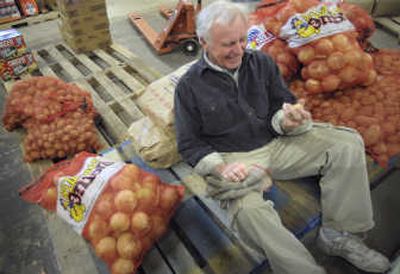Connect: Godsend for the Salvation Army

This morning there are a lot of potatoes and enough onions to make the whole city cry at the Salvation Army warehouse.
A note on the wall that says “TEFAP” – The Emergency Food Assistance Program – is taped above pallets of canned goods, beans, stew, rice and tomatoes – ingredients that form the basics of a simple, federally supported kitchen.
It’s freezing outside so the warehouse is a little chilly, but Bob Gregson doesn’t seem to notice. He’s wearing two shirts, solid workpants and thermal socks, and he’s always on the move when he is here.
“I often go all three hours without sitting down at all,” said Gregson. He’s a volunteer, yet he acts like he’s getting paid. Like clockwork he comes in, Monday through Friday, from 9 a.m. to noon, to take care of the food deliveries and make sure everything is stored properly and easy to find.
“Bob is a one-man army for us at the food bank,” said Carol Flummer, Salvation Army case manager and colleague. “He’s here five days a week, organizing, sorting, cleaning. He was indispensable during the food bank’s relocation in the fall of ‘07. Fellow volunteers call him Brother Bob – a tribute to his servant’s spirit.”
Gregson, 65, has volunteered at the warehouse since November 2006, when “I just called them and asked” if the Salvation Army needed help.
“I respect food, and I like food. I farmed toward the end of my career, and I hate to see food wasted. I hate to see it thrown around or thrown out. I think that’s some reasons why I like this so much.”
Born in Spokane, Gregson grew up in Pasco after World War II. In 1960 he was accepted to the United States Military Academy at West Point; he went to Vietnam after graduation and served in the Army for six years. “I really am a paradox because I’m an anti-war person today; I converted after the Vietnam War,” said Gregson. Yet he maintains a position as the West Point coordinator for the 5th Congressional District, recruiting candidates for the prestigious military academy from 72 high schools in Eastern Washington.
“If our soldiers have the best leadership possible, then ultimately that will help preserve lives,” Gregson said. After Vietnam he enrolled at Dartmouth College, and by 1972 he’d earned an MBA. He got married and eventually had three sons as he rumbled through a corporate career that began with Ford Motor Co. in Detroit and then took him to Seattle City Light in 1975.
He spent three years developing conservation programs for commercial and private power customers.
“There were some hugely talented people there,” Gregson said. “One of the things we developed was the energy audits that are still around today.”
But still, he moved on, searching.
“I joined a heat pump company in 1980, but we failed,” said Gregson. “I don’t know, I still think we were way ahead of our time.”
Then he was building director at Seattle’s Virginia Mason Medical Center.
“I wasn’t contented with any of the jobs I had. I mean, I had some moments of success, but I was never really happy.”
He divorced. And remarried.
“And then I started this whole new thing with a farm on Vashon Island,” Gregson said. “My wife, Bonnie, and I, none of us had any experience in farming, and I quickly realized that all the MBA analysis I’d done of small-acre farming before buying the place amounted to nothing but nonsense.”
Everyone told him there was no way he could make a living farming two acres, and that was just what it took to get him and Bonnie going.
“I like a challenge like that,” he said. “And we made it. We made a living.”
For 14 years, Gregson and his wife ran Island Meadow Farm, having most success with a salad mix they sold to restaurants in and around Seattle. The couple also had 300 free range chickens for eggs.
As the farm got established, they turned to Community Supported Agriculture (CSA), a business model in which customers buy shares of crops up front then pick up or have delivered what’s produced over the year.
So the West Point graduate had his boots solidly planted in the mud.
In 2004, a little twist of fate drew Gregson and his wife off the farm and back to Millwood in the Spokane Valley.
“My wife’s son married my cousin,” he said. “They met through us, of course.”
Soon, that alliance produced eight grandchildren in Spokane, which fueled Gregson’s desire to move out here.
“We love our little ‘United Nation’ family,” he said. “They have two adopted children from India, three adopted children from Ethiopia and three biological children.”
And the discontentment that kept Gregson moving from job to job for a good part of his life seems to at least be under control.
“I’m a really good fit here. It’s totally food; I like that,” said Gregson. “It’s a little physical, which also appeals to me, and I like that it’s five days a week. I just come in and get done what needs to be done, then I have the rest of the time to myself and my family.”